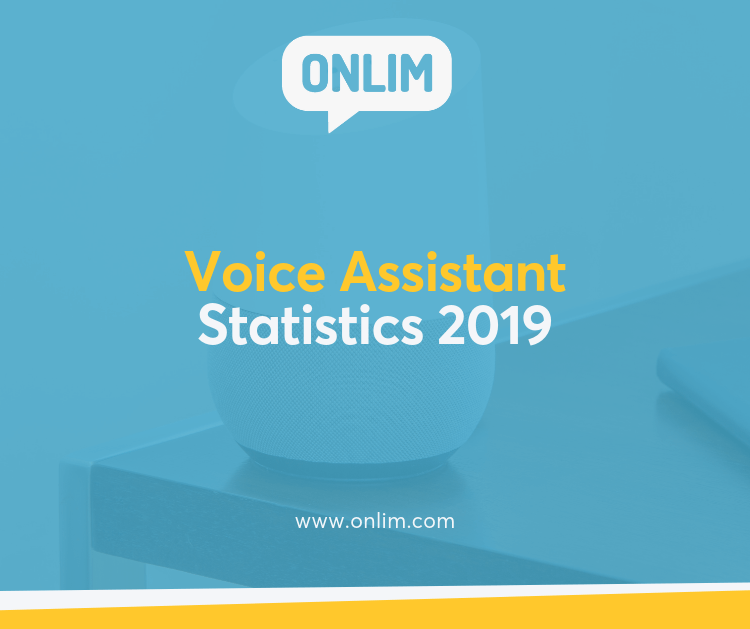Voice Assistant Statistics 2019
How popular are voice assistants in 2019? This article gives you an up-to-date overview of the market development and usage habits with a special focus on Voice Commerce.
Download our free e-book to learn everything you need to know about chatbots for your business.
Market shares & development
First, let’s look at the current market share of voice assistants. Which assistants should you keep an eye on? And how will the market develop in the future?
- The latest research by Strategy Analytics estimates that in 2019, around 50 percent of smartphones will have a virtual assistant that can be controlled by chat or voice. By 2023, availability on smartphones is expected to increase to 90 percent. (Strategy Analytics – 2018)
- The proliferation of smart speakers and other home devices will play an important part in spreading voice assistants. As the demand for smart speakers is increasing an increase in the usage of voice assistants can be expected. Currently, Amazon tops the list with 13.7 million products sold in Q4 / 2018, followed by Google with 11.5 million devices. In the future, a further increase in sales figures can be expected. (Strategy Analytics – 2019)
- To put it all together: According to recent research by Juniper Research, the number of voice assistants will triple by 2023. If this extrapolation is correct, 8 billion voice assistants would be deployed worldwide. That would be more voice assistants than there are currently people in the world. (Juniper Research – 2018)
- Furthermore, Juniper Research expects that multiplatform assistants are becoming more important. Applications that are made available by a special supplier, however, could lose importance. (Juniper Research – 2018)
Usage of voice assistant
In addition to the proliferation of different assistants and devices, usage behavior is of great importance as it provides valuable insights for businesses on what areas to focus on and how to engage with users.
- PWC took a closer look at the usage of voice assistants. Their study shows that the majority of the population is already aware of voice assistants. Only 10 percent of respondents say they have never heard of it. (PWC – 2018)
- The voice assistants are used especially at home on smart speakers on occasions such as during cooking, multitasking or watching TV. (PWC – 2018)
- The frequency of use depends among other things on the quality of the answers the users receive. Therefore, it’s interesting to know how often voice assistants already give the correct answer. In the annual Smart Speaker IQ Test, Loup Ventures examines how often voice assistants answer correctly. The assistants Google Assistant, Siri, Alexa and Cortana have been compared with each other in five categories (Local, Commerce, Navigation, Information and Command). Each assistant was asked the same question. The results from last year: 87.9 percent (Google Assistant), 74.6 percent (Siri), 72.5 percent (Alexa) and 63.4 percent (Cortana) of the answers were correct. (Loup Ventures – 2018)
Get weekly updates, tips, and tricks just like that into your inbox.
Voice Commerce
The field of “Voice Commerce” is of particular importance for companies. It provides a concrete use case in order to increase company sales if the channel is used correctly.
- Good news for companies who are active in Voice Commerce. Juniper Research expects sales in this area to reach $80 billion per year by 2023. (Juniper Research – 2018)
- Currently, some users are still hesitant regarding Voice Commerce. Although 50 percent of respondents say they have bought something with the help of a voice assistant, they purchased products of little value, such as food or a taxi ride. (PWC – 2018)
- However, the consulting firm Capgemini expects a significant increase. They estimate that spending on voice assistants will grow sixfold compared to all other channels, such as local businesses, websites, and apps within three years. (Capgemini – 2018)
- If a user decides to use voice assistants for shopping, they are usually very satisfied. Four out of five users say they are satisfied with their purchase. (Capgemini – 2018)
Retrieval Augmented Generation (RAG)
July 10th, 2024|
Is a voicebot right for my company?
June 18th, 2024|
What is Generative AI?
June 11th, 2024|



